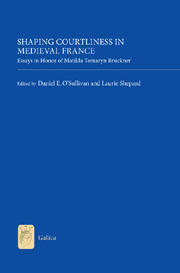Book contents
- Frontmatter
- Contents
- List of Illustrations
- Acknowledgements
- Introduction
- Matilda Tomaryn Bruckner: A Bibliography
- Part I Shaping Real and Fictive Courts
- Part II Shaping Courtly Narrative
- Part III Shaping Women's Voices in Medieval France
- Part IV Shaping the Courtly Other
- The Favorable Reception of Outsiders at Court: Medieval Versions of Cultural Exchange
- Shaping Saladin: Courtly Men Dressed in Silk
- Force de parole: Shaping Courtliness in Richard de Fournival's Bestiaire d'amours, Copied in Metz about 1312 (Oxford, Bodl. MS Douce 308)
- The Poetic Legacy of Charles d'Anjou in Italy: The Poetics of Nobility in the Comune
- Envoi
- List of Contributors
- Index
- Tabula Gratulatoria
- Already Published
Force de parole: Shaping Courtliness in Richard de Fournival's Bestiaire d'amours, Copied in Metz about 1312 (Oxford, Bodl. MS Douce 308)
from Part IV - Shaping the Courtly Other
Published online by Cambridge University Press: 05 May 2013
- Frontmatter
- Contents
- List of Illustrations
- Acknowledgements
- Introduction
- Matilda Tomaryn Bruckner: A Bibliography
- Part I Shaping Real and Fictive Courts
- Part II Shaping Courtly Narrative
- Part III Shaping Women's Voices in Medieval France
- Part IV Shaping the Courtly Other
- The Favorable Reception of Outsiders at Court: Medieval Versions of Cultural Exchange
- Shaping Saladin: Courtly Men Dressed in Silk
- Force de parole: Shaping Courtliness in Richard de Fournival's Bestiaire d'amours, Copied in Metz about 1312 (Oxford, Bodl. MS Douce 308)
- The Poetic Legacy of Charles d'Anjou in Italy: The Poetics of Nobility in the Comune
- Envoi
- List of Contributors
- Index
- Tabula Gratulatoria
- Already Published
Summary
Nule forche de parole ne me puet vers vous riens valoir.
Richard de Fournival, Bestiaire d'amoursIt is a pleasure to offer Matilda Bruckner this article on Richard de Fournival's delightful Bestiaire d'amours, to honor our forty-year friendship, and to reflect her own interest in animal/human connections expressed in her “Of Men and Beasts in Bisclavret” (1991), continued with her piece on “Beasts” for the 2005 Boston College exhibit Secular/Sacred, and most recently made manifest in the series of events that she organized at Boston College in the fall of 2011 under the rubric, “Animals and the Medieval Imagination.”
Courtliness
Courtliness is a style defined initially in the latter part of the twelfth and first half of the thirteenth century by literary works and associated social practices and performances (the rise of heraldry and tournaments, the production of illustrated manuscripts of vernacular literature). It emerges first in particular aristocratic milieux such as the royal court of Anglo-Norman England, the aristocratic courts of Occitania, Champagne, and Flanders, and then spreads to Paris and France (as well as Italy, Spain, Germany, and Crusader kingdoms to the East) – spectacularly in thirteenth-century Arras – and eventually also to wealthy cities such as Metz in Lorraine, an independent Francophone city within the German Empire during the later Middle Ages.
- Type
- Chapter
- Information
- Shaping Courtliness in Medieval FranceEssays in Honor of Matilda Tomaryn Bruckner, pp. 255 - 270Publisher: Boydell & BrewerPrint publication year: 2013



